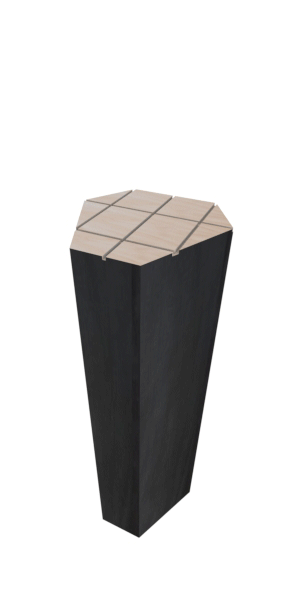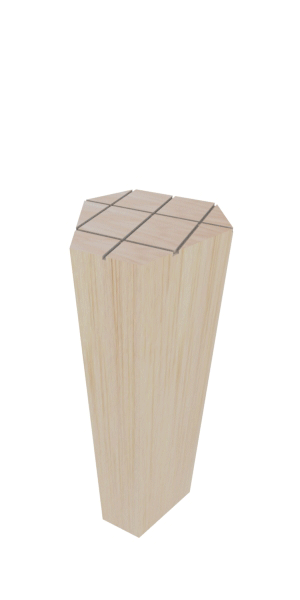
AJEDREZ
Chess
DISEÑO Y PROTOTIPO
DESIGN AND PROTOTYPE
RETO
Los requerimientos de este proyecto eran diseñar y desarrollar un prototipo de un ajedrez a partir de formas puras. Este proyecto se llevó a cabo durante el segundo año de carrera de Diseño Industrial junto con otra estudiante, Mar Oller.
CHALLENGE
The goal of this project was to design and develop a prototype of a chess using only pure or essential forms. This project was made during my second year at the university of Industrial Design with another student, Mar Oller.

PROPUESTA DE DISEÑO
DESIGN PROPOSAL

Perspectiva del juego de las piezas y en tablero en posición de inicio.
Top view of the starting position of pieces and the board.

Posición de inicio. Vista desde el lado de las Negras.
Starting position. View from the Black side.

Posición de inicio. Vista desde el lado de las Blancas.
Starting position. View from the White side.

Blancas en posición de inicio.
Starting position of the White pieces.

Negras en posición de inicio.
Starting position of the Black pieces.

Posición de inicio. Vista superior.
Starting position. Top view.
PIEZAS
PIECES

BLANCAS
WHITE
Vista frontal de las piezas Blancas.
Front view of the White pieces.

Vista trasera de las piezas Blancas.
Back view of the White pieces.
NEGRAS
BLACK

Vista frontal de las piezas Negras.
Front view of the black pieces.

Vista trasera de las piezas Negras.
Back view of the Black pieces.


CAJA
BOX

Caja. Vista general.
Box. General view.


Caja. Vista superior.
Box. Top view.
Caja con tiras de velcro en la cara inferior.
Box with velcro stripes on the bottom face.

Piezas guardadas en la caja. Vista superior.
Chess pieces in the box.Top view.

Piezas guardadas en la caja. Vista general.
Chess pieces in the box. General view.

Piezas guardadas en la caja. Vista lateral.
Chess pieces in the box. Lataral view.
TABLERO
BOARD


Tablero. Vista general.
Board. General view.
Tablero. Vista de detalle.
Board. Detail view.

Tablero medio doblado. Vista de detalle.
Half folded board. Detail view.

Tablero doblado. Vista general.
Folded board. General view.

Tablero doblado y caja. Vista general.
Folded board and box. General view.

Tablero doblado con caja y piezas. Vista general.
Folded board with box and pieces. General view.
PROTOTIPO
PROTOTYPE








DESIGN PROCESS
PROCESO DE DISEÑO
HERRAMIENTAS
TOOLS
SOLIDWORKS

Modelado 3D.
3D modeling.
ILLUSTRATOR

Ilustracioes.
Illustrations.
3DS MAX

Renders.
INVESTIGACIÓN PREVIA
Antes de empezar con la creación de ideas se investigaron que ideas eran interesantes para explorar y también hizo una búsqueda de opciones ya existentes en el mercado. Estas imágenes representan las ideas iniciales del equipo.

Before starting with the creative process, the team did some research to see what ideas were intersting to explore and what similar products were already in the market. These images respresent the initial thoughts of the team.
PREVIOUS RESEARCH
INSPIRACIÓN
INSPIRATION
El diseño presentado tiene una fuerte influencia de la cultura Japonesa.
A continuación se presentan 3 elementos de esta cultura que han sido la base del producto que se propone.
The design presented has a strong influence of the Japanese culture.
The 3 elements of this culture that have been the base of the design presented are explained next.

JARDÍN ZEN
Las piezas presentadas tienen unas lineas grabadas en la parte superior que representan los movimientos que puede hacer cada una de ellas durante el juego. La misma idea que se usa en los jardines zen, un estilo de jardín japonés dónde se utiliza arena rastrillada para representar el movimiento de pequeñas olas en el agua.
ZEN GARDEN
The chess pieces presented have engraved lines on the top face that represent the movement each one of them can do during the game. The same idea is used in the Zen gardens, also called Japanese rock gardens, where raked gravel or sand is used to represent ripples in water.
KOTATSU
Los principales materiales del diseño presentado son la madera y el textil, los mismos utilizados en el Kotatsu, un tipo de mueble tradicional Japonés que consta de un marco bajo cubierto con un futón sobre el que reposa una tabla de mesa.
The main materials of the presented design are wood and fabric, the same combination used in the Kotatsu, a traditional Japanese piece of furniture which consists of a low table frame covered by a futon upon which a table top sits.

GEISHA

Las piezas del juego tienen la cara trasera pintada de un color diferente del resto del cuerpo. El diseño esta basado en el característico maquillaje blanco que llevan las Geishas en cara y cuello con solo la zona trasera del cuello, la nuca, expuesta sin maquillaje. Esta es considerada una de las zonas eróticas primarias en la sexualidad japonesa. Las Geishas son mujeres Japonesas que desarrollan varias artes con el fin de entretener.
The chess pieces have the back face painted with a different color than the rest of the body. This design is based on the white make up that Geishas wear on face and neck with only the back area of the neck, the nape, left of bare skin exposed. This is considered a primary erotic zone in Japanese sexuality. Geishas are Japanese women who entertain through performing various arts.
PIECES
PIEZAS
DISEÑO DE LAS PIEZAS
El diseño presentado está basado en prismas hexagonales con 2 bases hexagonales distintas y 3 alturas diferentes, dependiendo de la importancia de cada pieza. Todas ellas tienen la parte posterior pintada del color contrario y todas, menos los peones, tienen gravadas unas lineas distintivas en la parte superior.
DESIGN OF THE PIECES
The design presented is based on six-sided prisms with 2 different hexagonal bases and 3 distinctive heights, according to the importance of each piece. All of them have the back face paited with the opposite color and also all but the pawns, have distinctive lines on the top face to distinguish between them.
Desliza para ver en detalle cada una de las propuestas.
Slide to the sides to see each one of the proposals in detail.
CAJA
BOX
La caja esta hecha con la misma forma que las piezas para que estas encajen entre ellas fácilmente y puedan guardarse por colores. La forma es compacta por lo que todo el conjunto también puede guardarse fácilmente.
The box is made with the same shape as the pieces so these can fit together easily and be separated according to their color. The shape is compact so it can be stored easily.

Planos generales de la caja.
General drawings of the box.

Caja. Vista general.
Box. General view.

Piezas guardadas en la caja. Vista lateral.
Chess pieces in the box. Lataral view.
TABLERO
BOARD
El tablero está hecho con cuadrados blancos y negros de tela de algodón. Se le han añadido dos tiras finas de tela en la parte trasera para poder enrollarlo y guardarlo, y dos extensiones más de tela blanca en los laterales para facilitar su acoplamiento a la caja.
The board is made with white and black squares of cotton fabric. It also has two thin stripes of fabric on the back part to rolled it up and store it, and another two pieces of white fabric on the sides with Velcro to make attaching the board to the box easier.

Planos generales del tablero.
General drawings of the board.

Tablero. Vista general.
Board. General view.

Tablero doblado. Vista general.
Folded board. General view.

Tablero doblado con caja y piezas. Vista general.
Folded board with box and pieces. General view.
CONSTRUCCIÓN DEL PROTOTIPO
PROTOTYPE ASSEMBLY
El desarrollo del prototipo se hizo en 2 fases: las piezas y la caja por un lado y el tablero por otro.
The development of the prototype was completed in 2 phases: on one hand the pieces and the box and on the other the board.
DESARROLLO Y MONTAJE DE LAS PIEZAS Y LA CAJA
DEVELOPEMENT AND ASSEMBLY OF THE CHESS PIECES AND THEIR BOX
Los listones de madera de balsa se marcaron y cortaron para obtener las piezas y las paredes laterales de la caja, posteriormente todas las partes fueron limadas. Las piezas se pintaron con pintura de pizarra negra y se les gravaron las lineas en la cara superior con una pequeña sierra de arco. Para la caja se acopló la base, previamente cortada, con las piezas laterales y se añadieron 2 tiras de Velcro en la parte inferior.
The balsa wood strips were marked and cut to make the pieces and the walls of the box. At the end of this process all the parts were filed. Afterwards, the pieces were painted with black chalk paint and the lines on the top faces were engraved with a small bow saw. For the box, the base, previously cut, was assembled to the walls and two Velcro stripes were glued to the bottom face.
MATERIALES
MATERIALS

Listones de madera de balsa.
Balsa wood strips.

Pintura de pizarra negra.
Black Chalk Paint.

Tira de Velcro.
Velcro strip.















DESARROLLO DEL TABLERO
DEVELOPEMENT OF THE BOARD
El tablero se desarrolló en 4 partes y posteriormente se cosieron entre ellas para completarlo. Se incorporaron las extensiones laterales con las tiras de Velcro y al final se le añadieron los cordones en la parte posterior.
The board was made in 4 pieces that afterwards were sewn together. Two other lateral pieces of fabric were added with velcro stripes on them and 2 thin fabric cords were used to keep the board folded.
MATERIALES
MATERIALS

Tela de algodón blanca.
White cotton fabric.

Tela de algodón negra.
Black cotton fabric.

Tira de Velcro.
Velcro strip.












